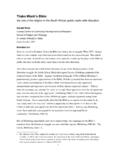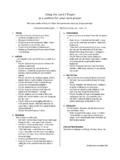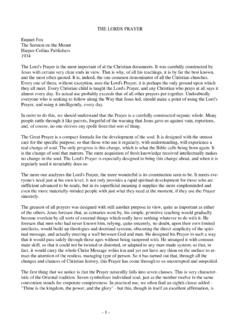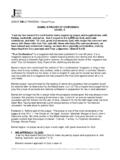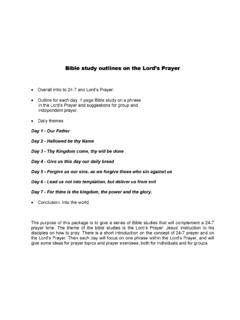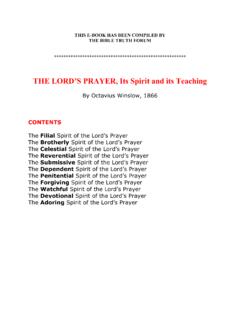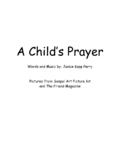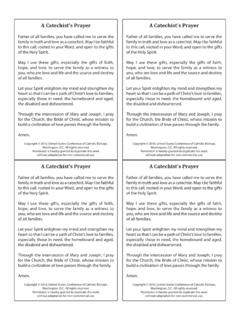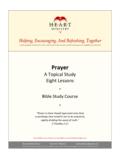Transcription of An Adult Study of “The Lord’s Prayer” - Chora …
1 1An Adult Study of The lord s prayer This Study guide is based on the book, Praying the lord s prayer : An Ageless prayer For Today by Herman C. Waetjen, published by Trinity Press International, 1999. The guide is divided into ten sessions of Study related to the ten chapters of the book. Welcome to a course of Study on the lord s prayer ! Ten sessions will be devoted to this topic, exploring the content of this prayer , and to some extent including problems that are generally associated with prayer and praying. Words to the Convener The convener of this Study group is not expected to be an expert in biblical studies or the lord s prayer .
2 He or she is expected, however, to be prepared to guide the group in this Study . In preparation for this responsibility the following suggestions may be helpful. 1. Read through the assignment for each session before your class meets in order to be well prepared to guide the discussion and give it direction corresponding to the material presented in each chapter. Be sure to enter the very first session of the course having read both the Introduction and Chapter One of the book, even though it will be assigned for the second session. 2. Choose a room, if possible, where the class can be divided into small groups for more personal dialogue, whenever that seems to be gainful and advantageous.
3 3. Encourage class members to prepare the weekly assignments and to bring a Bible to class, perhaps also a notebook. 4. Be sure to provide additional resources whenever they are called for. 5. When two petitions (as in sessions 6 and 9) or two different versions of the same petition (one in Luke and the other in Matthew) are to be discussed in a particular session, it would be very helpful to write them side by side on the chalkboard or on a flip-chart. 6. When difficult words are encountered, like eschatological and aorist, be sure to check the glossary at the end of the book. 2 Session One prayer and Praying The objective of this opening session is to evoke and stimulate general discussion on prayer and praying.
4 Since the content and activity of prayer tend to be private, there may be reticence initially to share something of the why, when, and what of praying. Consequently this session should be exploratory, but easygoing and relaxed. Questions about prayer and praying may be forthcoming, and, as they are verbalized, they should be recorded on a flip chart and revisited from session to session, or at least at the final session of the course. At the same time, the following questions may be used to engender thoughtful discussion. Perhaps they should be written on the chalkboard or on a flip chart. 1. Is prayer difficult?
5 Why? 2. Is it difficult to speak to an Other whom we don t know? 3. How much is it necessary to know about God in order to start praying? Why Do We Pray? Habit? We want something from God? We are in a crisis and need help? We have an intimate relationship with God that keep us in communion with God? When Do We Pray? In church on Sundays, or also every day at home and at work? When we are in trouble? When we have problems we can t handle? Whenever possible because of our intimate relationship with God? What Do We Pray For? What is the Content of Our prayer ? Requests for guidance in our decision-making?
6 Protection for our loved ones and for ourselves? For healing? For things we need: food, clothing, work, passing a test, entrance into a college? For family, friends, church, neighbors? For our government leaders and representatives? For justice and peace in the world, and very concretely for war-torn countries? prayer is uttered, spoken in different contexts: Crisis, fear, sickness, thanksgiving, Christmas, Easter, Sundays in church, decision-making, marriage, birth, death, travel, etc. But there is a context for prayer that is not an event of any kind. 3 The most basic context for prayer is simply a relationship with God.
7 From within this context prayer can be spoken at any time, anywhere, for any and every reason. What kind of a relationship with God do we have? What kind do we want? Read Psalm 42 in Brandt, Kent, Psalms Now for a prayer that struggles to recover a relationship with God that is vital and real in being emotionally experienced. As a desert wanderer longs for springs of cool water, so my thirsty soul reaches out for You, O God. How I long for a deeper sense of Your presence, for a faith that will embrace You, without fear or doubt! Yet while I weep in longing, people about me say, If God is not dead, where is He?
8 I remember so well the faith of my childhood. How real God was to me in those Homework Please read the Introduction and Chapter 1 for the next class session. Session Two Christian Self-Understanding What forms of address do we use in our prayers? Creator, Redeemer, Eternal God, Savior, Father, Mother, The forms of address we use imply something of our self-understanding in relation to God. Addressing God as Creator highlights our identity as creatures . Addressing God as Savior emphasizes our self-understanding as saved . Addressing God as Eternal God reminds us of our finitude. Addressing God as Parent places us in a family relationship to God.
9 What kind of a relationship with God do we presuppose for ourselves? 1. A Parent-Child relationship? Characterized by a hierarchical relationship to God. By a total dependence on God as our Creator and Redeemer. For the benefits of the forgiveness of sins and eternal life. And how in this kind of relationship do we deal with our insecurities? 4By a purity code that divides the world into the dualistic realms of the clean and the unclean; and we, by associating ourselves with the clean and avoiding contact with the unclean, protect ourselves from contamination? By a covenant of reciprocity, like that of Deuteronomy, which obliges us to fulfill God s will to ensure God s continued love, faithfulness, and protection for ourselves and our loved ones?
10 By embracing illusions, fantasies, character defenses and co-dependencies to control life in order to protect ourselves against the terrors of our historical existence: absurdities, accidents and premature death? What kind of prayers do we pray in our parent-child relationship to God? Can you recall and share any prayers you prayed in your childhood? 2. A Parent- Adult relationship? What are the changes that occur when adults have children who become adults ? What are the expectations of the parents for their Adult offspring? What are the expectations that the Adult offspring now have of their parents?
